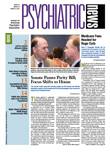The Senate approved a compromise mental health insurance parity measure last month, which marked the first time either chamber of Congress has passed a stand-alone, comprehensive parity bill.
The measure (S 558), which was passed on September 18, is a carefully worded compromise between a limited earlier Senate version and a more generous House bill. The bill would provide strong federal protections for mental health care, including substance use disorders, and require health care plans' treatment limitations and cost-sharing requirements to be equal to those for other medical services.
The Mental Health Parity Act of 2007 would require equal application of treatment limitations, number of visits, copays, deductibles, and coinsurance.
APA has long fought for parity legislation. APA's advocacy received help from the Coalition for Fairness in Mental Illness Coverage, to which APA belongs. The coalition has worked with Senate parity supporters—including Sen. Edward Kennedy (D-Mass.), chair of the Senate Health, Education, Labor, and Pensions Committee—for 10 years on federal parity legislation.
“As physicians on the front line of treatment for Americans struggling with mental illness, including substance use disorders, we know firsthand that treatment works,” said APA President Carolyn Robinowitz, M.D., in a written statement. “Nondiscriminatory access to mental health care, including substance use disorder treatment, will make a real difference in the lives of millions of Americans.”
The final legislation, passed by voice vote, was the result of a compromise between health care organizations and the business and insurance communities. Data on the minimal costs of offering parity for mental health care overcame long-standing opposition from the business community to parity legislation.
The measure aims to provide a solid new federal “floor” of parity protections for mental health and substance disorder services, while ensuring that state parity laws that are more protective of patients' access to care would not be preempted by federal law.
The Senate bill mandates mental health coverage for nearly 113 million people who have insurance coverage.
The bill is a “landmark agreement between health care organizations and the business and insurance communities,” Robinowitz said. “APA is proud to have been a part of this effort.”
The Senate bill came after nearly two years of talks between the bill's sponsors—including Sen. Pete Domenici (R-N.M.) and Sen. Michael Enzi (R-Wyo.)—and mental health advocates and business-community representatives. The negotiations yielded progress by avoiding the most contentious issues, such as specifying the specific mental illnesses that would be covered and convincing parity opponents that the idea wasn't as expensive as they thought because plans already cover them.
The compromise became acceptable to mental health care advocates after Senate supporters researched nearly 150 health plans across the country and showed that those plans already paid for coverage of almost all of the most serious mental illnesses.
The Senate-approved compromise addressed the thorny issue of whether to preempt tougher state mental health parity laws. Business groups at first pushed for preemption but then compromised on a federal “floor” of benefits after states with strong parity laws objected to the possibility of having their laws preempted.
“The bill we passed represents an agreement, after 10 long years of stalemate, not only between Democrats and Republicans, but also with the mental health community, businesses, and the insurance industry,” Kennedy said in a statement. “We came together and decided that for too long, persons living with mental health disorders have suffered discrimination at all levels of society.”
The push for parity legislation has shifted to the House of Representatives, where the Ways and Means Subcommittee on Health voted in support of its version (HR 1424). The subcommittee approved the measure on September 19 on a 10-3 bipartisan vote that augured well for passage by the full chamber.
The House bill contains several provisions that differ from those in the Senate bill. It includes, for example, a more specific definition of the conditions insurers would have to cover, and it would go into effect January 1, 2008, rather than a year after becoming law, as specified in the Senate measure.
The subcommittee rejected an amendment that would have allowed insurers to define which mental health conditions their policies covered, instead of the House bill's language that requires coverage of all illnesses in DSM-IV.
Specifying which mental illnesses health plans would be required to cover in a parity law continued to draw protests from business groups, which have long argued that mental health parity was the beginning of a federal effort to mandate what benefits they would have to provide.
The House Ways and Means Committee passed the bill on September 26 by 27-13, with the support of three Republicans and all of the panel's Democrats. The committee rejected several amendments, including one that would have replaced the House language with the text of the Senate-passed bill and an amendment that sought to remove the use of DSM-IV as the basis for coverage requirements.
The final panel with jurisdiction over the bill, the Energy and Commerce Committee, had not scheduled a vote by press time.
If the House passes its parity bill, a conference committee will still have to work to resolve differences between the House and Senate versions. Although the full House is expected to easily pass a parity bill, the legislation that eventually emerges from a conference between the two chambers is more likely to resemble the Senate package, because that version is a hard-won compromise with wide support from insurers and businesses, according to mental health advocates.
